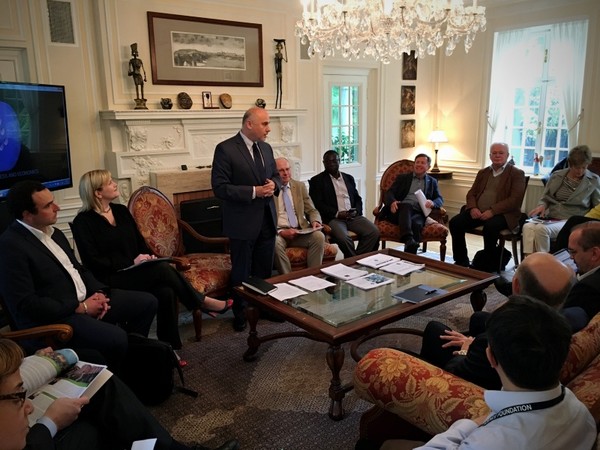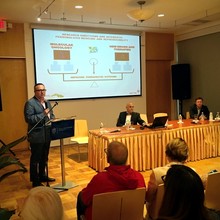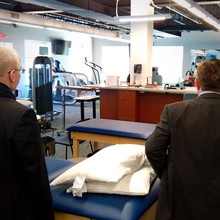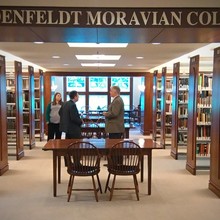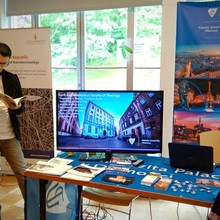Meeting with important universities and research institutes and new impulses for continuation and deepening of previous collaboration – these are the results of the Palacký University delegation’s visit to the United States. The UP delegation also met with the representatives of the Embassy of the Czech Republic in the United States of America and successfully presented the excellence of UP institutes to the academic as well as broader US public.
Representatives of Olomouc’s university arrived in the US together with the representatives of Mendel University in Brno at the invitation of the Czech Embassy, which proposed genetic research as one of the main topics. Palacký University was represented by UP Rector Jaroslav Miller, Dean of the UP Faculty of Science and Director of the Centre of the Region Haná for Biotechnological and Agricultural Research Ivo Frébort, Director of the Institute for Molecular and Translational Medicine at the UP Faculty of Medicine Marián Hajdúch, Vice-Rector Vít Zouhar, and Head of the International Relations Office Dalibor Mikuláš.
The programme of their five-day visit included negotiations and discussions on mutual collaboration in the area of science and academic administration with institutions such as the National Science Foundation, the National Institutes of Health, the University of Maryland, Georgetown University and George Washington University. Both Czech universities were also presented at the EU Open House event organised by the Czech Embassy for the public. At the end of the visit, the Olomouc delegation also met with the management of Moravian College in Bethlehem, PA, the University of North Texas, and New York University.
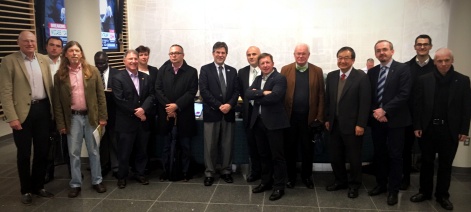
“American science has the highest reputation, and so Palacký University is eager to cooperate with the leading research centres in the USA. If you are not connected with research partners, you are virtually non-existent. Our journey had a significant PR effect too, and I am glad to say that we were quite visible. As during the Open House event at the Czech Embassy, we presented the University before more than a thousand people and we were even addressed by some prospective students. I was also pleased to meet a former president of the Society for Science and Arts with whom I am organising the transfer of his personal archive into our Centre for Czechoslovak Exile Studies. I would like to thank the Embassy of the Czech Republic for perfect service and also Ivo Frébort, Vít Zouhar, Marián Hajdúch and Dalibor Mikuláš. They were competent partners in the challenging discussions and managed to clearly persuade our American counterparts that we have something to offer. And, that’s not the end of the story yet, because many of the colleagues from the American institutions have accepted our invitation to come to Olomouc. First, in June, representatives from the National Science Foundation, the largest American grant agency, will come to assess the possibilities of announcing American-Czech research projects,” said Rector Jaroslav Miller.
Ivo Frébort, UP Faculty of Science Dean, also appreciates the mutual benefits of the journey to the USA: “For me, the visit to Washington was very valuable, with respects to deeper understanding of the situation and the possibilities of co-operation with the American universities and institutions. The event, which was well prepared by the Czech Embassy, enabled us to meet with the top management and scientists working in fields of potential co-operation that had been chosen before according to our professional profiles,” stated Ivo Frébort.
According to Marián Hajdúch, head of the IMTM, the main achievement of the visit was presenting the Olomouc institutions, research projects and technological possibilities to the American scientific community. “The aim was to extend ongoing collaboration, to find finances for research and to intensify the exchange of students and researchers.”
Presentations, discussions, impulses
The negotiations with the representatives of the individual institutions brought much inspiration. According to Hajdúch, one of the most interesting was the visit of the National Cancer Institute (NCI) of the National Institutes of Health, which is regarded as the biggest and most well-known institute for cancer research in the world. “We were hosted by foremost specialists, such as Jean-Claude Zenklusen, Director of the Cancer Cell Genome Atlas, the largest genetic database of human tumours, and Christopher M. Hartson, Programme Director of the NCI Office of Cancer Nanotechnology Research. The meeting was mutually very beneficial and suggested the possibilities of future co-operation in which both parties are interested,” stressed Hajdúch.
Dean Ivo Frébort also appreciated the meeting with the representatives of the National Science Foundation, which was devoted to the support of co-operation, grant policy, possibilities of Czech and American co-operation and mainly the development of the scientists’ and students’ mobilities. "During the negotiations at the universities, I focused mainly on presenting the infrastructure and possibilities of the Centre of the Region Haná and looking for possible collaborative research projects,” Frébort said.
Deepening ongoing co-operation
The visit to the USA was also an opportunity for personal meetings with those American partners that the Olomouc research centres have been in contact for years. “At the University of Maryland, I was pleased to meet and talk with Prof Angus Murphy, with whom we’ve been working for some time on research of the hormonal regulations of plants, and I enjoyed the discussion at Georgetown University on collaborative research into cannabis genetics and its use in medicine. I was also pleased that my own presentation at the Czech Embassy was attended and commented on by the general public,” said Frébort.
“We also met Mary Purucker from the National Center for Advancing Translational Sciences, with whom we have been long working together in the field of translational medicine. With the Center, we have initiated a programme of external quality control in the sphere of high-capacity medication screening, launched only last week. And most of the renowned centres and pharmaceutical companies are going to join this programme,” described Hajdúch. “It was a great honour for me to meet Jan T. Vilček of the New York University School of Medicine, who is an iconic scientist in the field of tumour immunology and inflammatory response regulation. A long time ago I studied his work as a student. His research finally led to the development of the first humanised monoclonal antibody against one of the anti-inflammatory cytokines, which is commercially used in the therapy of autoimmunity and inflammatory diseases. This medicament has dramatically changed the quality and length of lives of our patients and is one of the three most successful medicaments in the world," explained Hajdúch.
Realistic perspectives
The discussion topics revealed possibilities of cooperation, especially in the field of whole-genome tumour sequencing. “To supply the need of a rising population and geographical variability we intend to supplement the worldwide databases with the tumour sequences of our patients. We also aspire to join programmes utilising new technologies in medicine in the fields where we have already achieved acknowledged results, such as in proteomics, nanotechnology, research and development of medications, personalised medicine and biomarkers,” declared Hajdúch.
He emphasised that the visit in the USA enabled several new projects to launch. “We will probably begin with exchanging some critical specimens of our biobanks, with students’ and researchers’ mobilities, and with specific co-operation in the research of protagonists and antagonists of adenosine receptors, metabolism of nucleolar and ribosomal proteins or circulating cancer cells,” said Hajdúch.
